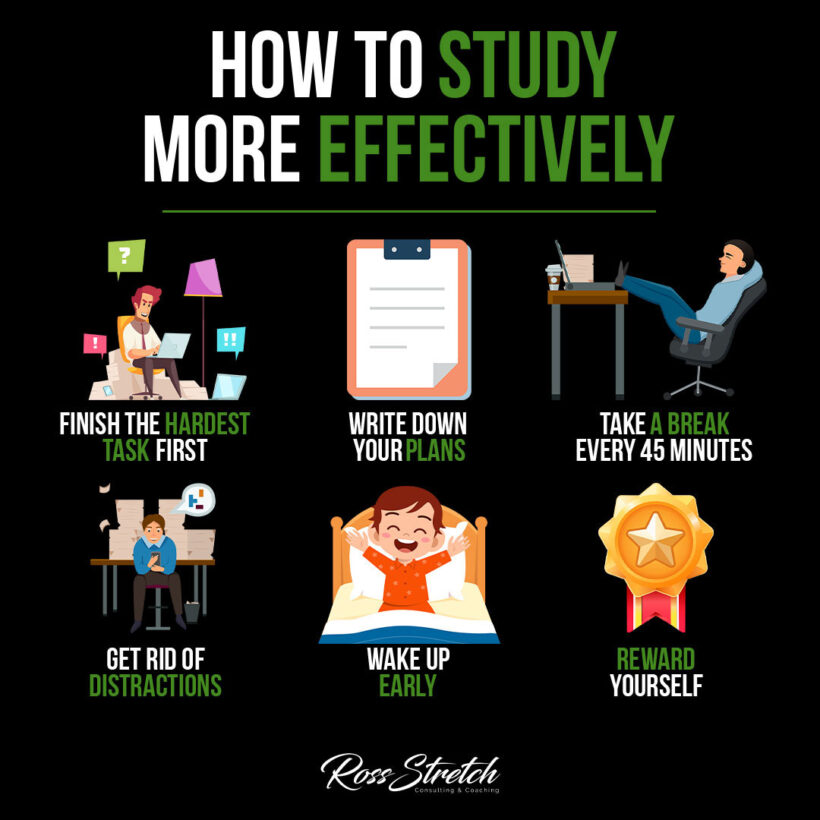Studying effectively is not just about spending more hours with your books; it’s about making the most of your study time. With the right strategies, you can improve concentration, enhance retention, and reduce stress. Here are six proven techniques to help you study more efficiently and get better results.
1. Finish the Hardest Task First
When studying, tackling the most challenging task first is a powerful way to stay motivated. Known as “eating the frog,” this approach ensures that you handle the most demanding material with a fresh mind, allowing you to accomplish it before fatigue sets in.
- Benefits of Completing Difficult Tasks First:
- Reduces Procrastination: Getting the toughest task done eliminates the urge to procrastinate.
- Builds Confidence: Finishing hard tasks first boosts your confidence and motivates you to keep going.
- Improves Focus: Handling challenging tasks early in a session helps you focus while you’re still energized.
Starting with the hardest task sets a productive tone for the rest of your study session, making other tasks seem more manageable.
2. Write Down Your Plans
Planning is essential for effective studying. By writing down a study plan, you clarify what you need to accomplish, organize your time, and hold yourself accountable. Break down your goals for the day, week, or month, depending on the scope of your studies.
- Tips for Creating an Effective Study Plan:
- Set Clear Objectives: Identify what you need to achieve in each session.
- Prioritize Tasks: Rank tasks by importance and difficulty to maximize productivity.
- Create a Timeline: Allocate time for each task to ensure you stay on track and cover all necessary material.
A written study plan keeps you organized, reduces stress, and helps you track your progress.
3. Take a Break Every 45 Minutes
Long study sessions can lead to burnout, so taking breaks is crucial. Studies show that taking short breaks after intense focus periods can improve concentration and memory retention. The Pomodoro Technique, for example, involves working for 25-45 minutes followed by a 5-10 minute break.
- Why Taking Breaks Enhances Study Efficiency:
- Prevents Mental Fatigue: Breaks allow your brain to recharge, preventing burnout.
- Improves Focus and Retention: Regular breaks help sustain focus and improve memory retention over long study sessions.
- Reduces Stress: Pausing to relax can relieve stress and enhance your mood, making it easier to resume studying.
Try stepping away from your study area, stretching, or taking a quick walk during breaks to refresh your mind.
4. Get Rid of Distractions
Distractions are the biggest productivity killers, especially when studying. From your phone to notifications, even minor interruptions can disrupt your focus. Minimize distractions by creating a dedicated, quiet study space and silencing unnecessary devices.
- Tips to Minimize Distractions:
- Turn Off Notifications: Silence phone and app notifications or use “Do Not Disturb” mode.
- Use Focus Tools: Consider apps like Forest or Focus@Will to help keep you on task.
- Create a Quiet Environment: Let others know you’re studying to minimize interruptions, and choose a quiet location free of distractions.
A distraction-free environment improves concentration and helps you get more done in less time.
5. Wake Up Early
Starting your day early allows you to make the most of the quiet morning hours, which are often free from distractions. Early risers tend to be more productive, and starting your study session in the morning can enhance focus and motivation.
- Benefits of Early Morning Study Sessions:
- More Productive Hours: Mornings provide uninterrupted time for focused study.
- Better Concentration: Early hours are typically quieter and less distracting.
- Increases Discipline: Waking up early builds self-discipline, a habit that can benefit all aspects of life.
Try to establish a consistent wake-up time and start your studies early to maximize your productivity throughout the day.
6. Reward Yourself
Studying effectively is hard work, and rewarding yourself can keep you motivated and reinforce positive habits. Whether it’s a small treat, a break, or a relaxing activity, giving yourself a reward after a productive session makes studying feel more satisfying and manageable.
- Types of Rewards for Motivation:
- Small Treats: Enjoy a snack, a short walk, or a few minutes of your favorite show.
- Self-Care Breaks: Use break time for activities you enjoy, like listening to music or meditating.
- Milestone Rewards: Set bigger rewards for completing major goals, like finishing a project or acing a test.
Rewards create a positive reinforcement loop, helping you stay committed to your study goals.
Conclusion
Studying effectively requires discipline, organization, and self-care. By implementing these six techniques—starting with the hardest task, writing down your plans, taking regular breaks, eliminating distractions, waking up early, and rewarding yourself—you can optimize your study sessions and achieve better results. Building these habits will make studying less overwhelming and more productive in the long run.
References and Further Reading
- Harvard Business Review – Science-Backed Techniques for Learning
- Atomic Habits by James Clear – A comprehensive guide to building effective habits.
- Pomodoro Technique – Time Management Method


